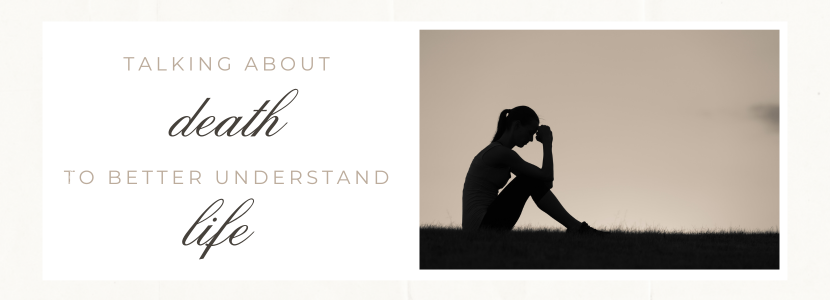
By Kristy Chenell, Grief Guide
I was so scared I was numb. What if I saw them die in front of me? What would it be like to see them living one moment and dead the next? Where would they go, if they went anywhere at all?
I couldn’t comprehend what was happening and I couldn’t (or didn’t know how) to talk about it.
As I witnessed both my parents’ dying trajectories in my early 30’s, I found myself feeling profoundly alone. Sure, there were hospice nurses who explained what was happening to my parents’ bodies, normalizing the physical dying process and yes, friends and family would visit for short periods of time to show their support and say goodbye, but no one talked about what they were feeling, especially me. It actually seemed like everyone else was doing okay while I was a mess.
But were they really “okay?” Was I really “broken?” Or, were we simply living in a culture that sees death as a taboo topic in which talking about thoughts and feelings can bring about more pain and suffering, therefore we try to avoid it?
Death is inevitable. For all of us. And as uncomfortable it may be, the more we work through this certainty and our grief around it, the more fuller life may be.
If you would have told me this before my parents’ deaths, I would have balked. There was no meaning in death and my bereavement, just the Five Stages of Grief defined by Elisabeth Kübler-Ross that I would have to endure.
But since their passings, my perspective has drastically changed. I trained with hospice, became a direct-patient volunteer for those dying, researched and sought out both traditional western and holistic naturopathic grief coping modalities, and am now pursuing a graduate degree in Thanatology: the study of death, dying, and bereavement.
Have I filled the hole in my heart that was left from my parent’s deaths? No, that will never happen. But is my life bigger from the learning and growth that has happened? Yes.
Throughout my journey, I have noted new beliefs that have shaped my processing of death and grief. I share them with you now in hopes they may shed new light on a commonly dark topic.
1. Grieving is not weak and neither is talking about death.
Actually, I think it’s the opposite:
- accessing and processing thoughts and feelings about death, dying, and loss takes courage.
- leaning into feelings isn’t easy and should be recognized for the strength it takes.
- such awareness of death and grief can bring about learning and growth.
- not having answers is not weakness, it’s opportunity for deep exploration.
2. There are no specific stages to how one grieves.
When would the anger come? I hadn’t experienced the anger! I waited, but it never came.
In addition to not personally experiencing the Five Stages of Grief created by Elisabeth Kübler Ross, I have learned throughout my research and studies that this is simply a theory and one that doesn’t hold true to everyone.
Once I realized that my grief didn’t have to follow a certain model, I felt at ease with my actual feelings and let the unrealistic expectation of grieving in a certain way go. It was freeing to feel I could grieve how I wanted and that I wasn’t doing it “wrong.”
3. There are many ways to process and cope with death and grief.
Western medicine may prescribe a pharmaceutical and/or suggest professional counseling and for some, these measures are helpful and necessary. But they aren’t the only ways to cope with, and process, death and grief.
For example, some of the most beneficial tools in my grief journey have been those which connect the mind and body in order to make new neural pathways for emotional processing. Walking, yoga, outdoor activity, journaling, acupuncture, EMDR (Eye Movement Desensitization and Reprocessing), and plant medicine such as adaptogen herbs and psilocybin micro-dosing have helped me access stuck emotion and process the deaths of my parents.
Although my grief is not gone (and never will be), I relate to it much differently now than I did years ago and it has made all the difference.
Grief can throw self-identity and the world as one knows it into complete disarray. If you are struggling with grief, know that you are not alone. Although it is an individual journey, there are many resources to seek out that can help you process such pain and suffering.
To learn more about why and how to process grief, I invite you to my complimentary 30-minute Introductory Grief Processing Sessions.
Also, group sessions that focus on applying specific topics to your own grief journey are offered monthly and personal sessions in-office or on-site at a private home, hospital, or facility are available.
Together, we can make it through. Contact me for me support.
The CNMA office provides naturopathic care, testing, massage, holistic counseling, and grief guidance to those in Castle Rock, Castle Pines, Highlands Ranch, Lone Tree, Centennial, Parker, Larkspur, Monument, Colorado Springs, and the greater Denver metro area. For those outside of these areas, virtual appointments are available.
References

Leave a Reply